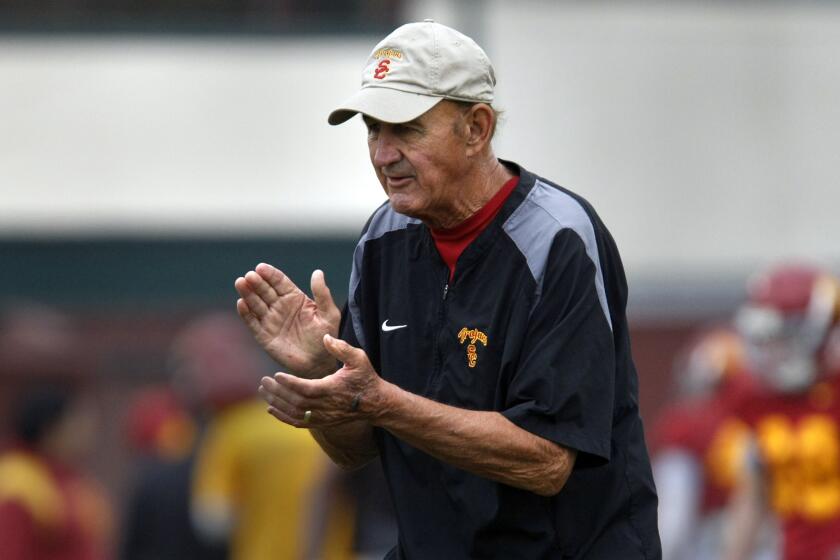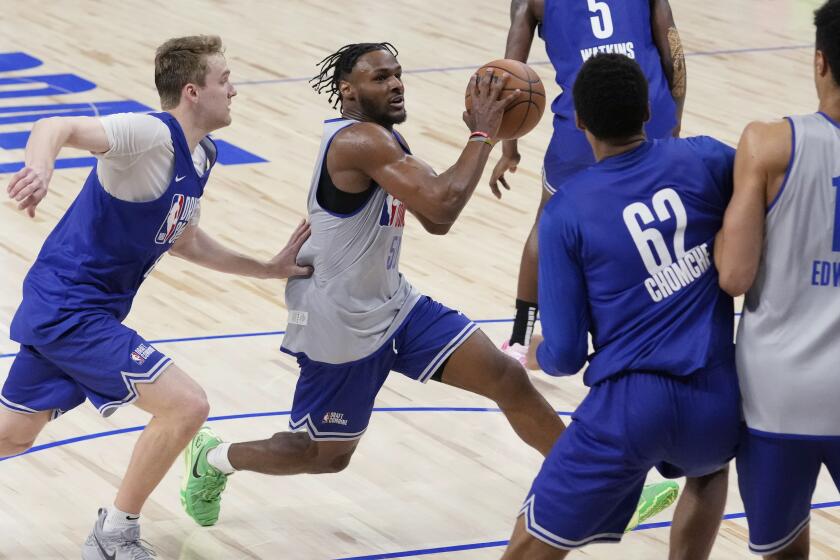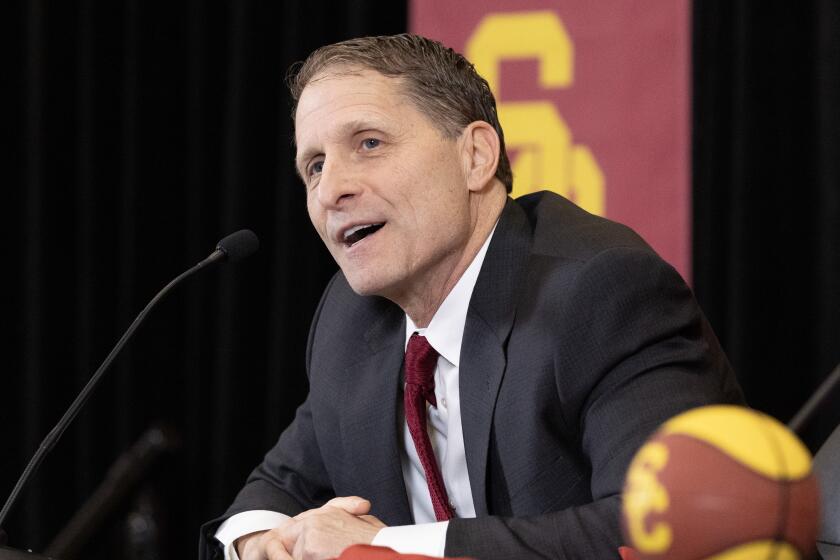Herrin Pays Price for Agent’s Gifts : College football: USC linebacker accepts responsibility for breaking NCAA rules but, like others before him, questions the system.
USC linebacker Errick Herrin was stiff and sore Sunday and Monday, but he expected as much. It comes from playing an entire football game after having only watched for five Saturdays.
But that kind of pain, Herrin said, is preferable to the kind he experienced while serving his recent five-game suspension. Accepting a telephone pager and a Las Vegas trip from a sports agent in violation of NCAA rules cost him half his senior season.
Back on the first-team defense after five weeks of being a practice-time backup to his replacements, Brian Haas and Mark Cusano, Herrin played the whole game Saturday in USC’s 31-30 victory over Stanford at the Coliseum.
“It was a long week for me,” Herrin said. “I felt like I was under a lot of pressure . . . like I had to come back and prove myself all over again to the coaches and my teammates.
“During all that time [on suspension], all I could think of was that I’d been handed the best opportunity of my life--to become a USC football player--and that the whole thing nearly went down the toilet.
“The worst part of it was, for part of that time I didn’t know if my career was over or not. There was a lot of waiting, wondering if they’d let me play again at all. And all during that time, I never thought I’d done anything that was so terribly wrong.
“I didn’t know exactly what the suspension was [five games] until right after the Notre Dame game, when they told me. I’d already missed three games, so until then I was in the dark.
“All those practices I went to, not being sure if I’d ever play again . . . that was really hard.”
Early in his suspension, Herrin said, former junior college teammates came calling. Herrin transferred to USC from Mt. San Jacinto College in 1994.
“Cedric Thomas and Bernie Sanders, my former teammates, came up to spend some time with me, and that really meant a lot,” said Herrin, who lives in a USC-area apartment with an older brother.
“They were worried about me. I was able to talk the whole thing out with them and that helped a lot.”
In the aftermath, he accepts responsibility for having broken NCAA rules, yet questions an amateur sports system that so amply rewards U.S. Olympic-level athletes in other sports yet confines many NCAA scholarship athletes to a near-poverty line life style.
“I feel like everyone else [on the football team], that we get cheated,” he said.
He referred to the Pacific-10 rule restricting athletes to one training table meal a day and the $7 per diem that is supposed to cover breakfast and lunch. On days when there is no training table, like Sundays, the $7 is supposed to cover all three meals.
“We make a lot of money for this school,” Herrin said. “The system has to be changed. Everything else changes, including the cost of living. Why doesn’t college sports [change]?
“I’m not complaining about my situation. I’m luckier than a lot of guys. I’ve got a brother who helps me out and I get some military benefits. I don’t have to worry as much about the water or electricity bills like some of the guys.”
Herrin, 26, is a Gulf War veteran.
Known more as a championship high school wrestler than as a football player in Akron, Ohio, Herrin enlisted in the Marine Corps. He was serving as a postal trainee when the Gulf War erupted.
He remembers the night of Feb. 25, 1991, when an Iraqi Scud missile slammed into a barracks full of U.S. troops in Saudi Arabia, killing 28.
“It wasn’t all that far from where I was stationed,” he said. “We could see the flames on the horizon.”
He wouldn’t compare any of the stress of his four years in the Marines to his recent predicament.
But he was clear about one thing.
The loss of five games from his college football career caused a special kind of pain.
Go beyond the scoreboard
Get the latest on L.A.'s teams in the daily Sports Report newsletter.
You may occasionally receive promotional content from the Los Angeles Times.



